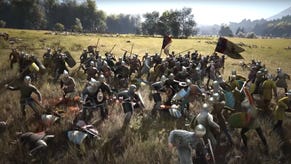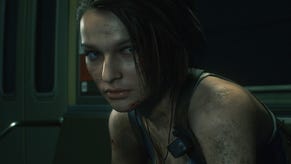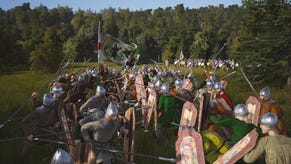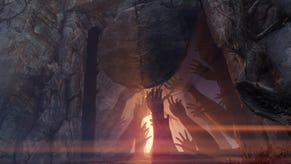Elden Ring creator Hidetaka Miyazaki on originating the Soulslike genre
"We don't like to feel pressured by what other studios are creating."
Hidetaka Miyazaki didn't envision originating an entire genre. Yet such is the popularity of the Dark Souls games - right up to the more recent Elden Ring - that they've become collectively known in the gaming community as Soulslikes. That's shorthand for games with calculating combat, high levels of challenge and repeated death, though this is of course reductive of the awe and grim majesty Miyazaki's games evoke.
Soulslikes are everywhere now. From indie games utilising specific mechanics, to larger projects specifically trying to out-do FromSoftware at its own game. That's testament to the influence of Miyazaki's work, though he remains humble when discussing his oeuvre with me ahead of announcing the release of Shadow of the Erdtree, Elden Ring's upcoming major expansion.
"We certainly didn't come up with the term Souslike and we didn't envision it as a new genre or a new term for the industry," he tells me. "So of course when it first started cropping up... we were very surprised.
"We felt a little bit honoured, but also there was a lot of trepidation there. We thought 'is this really ok? Is this really what we are making? And is this really what we want to be known for?'"
It's certainly what Miyazaki has become known for, whether he anticipated it or not. Beyond the previous success of the Dark Souls games, Bloodborne, and Sekiro: Shadows Die Twice, Elden Ring sold over 20m copies in under 12 months and received countless Game of the Year awards. It inspired YouTube lore channels and modders and fan recreations; players controlling the game with everything from a harp to a banana. And it inspired others to copy his homework.
"The term Souslike is, as I'm sure you understand, very vague," says Miyazaki. "And there are lots of ways that can be interpreted... and I don't think any of them are wrong."
Perhaps, I suggest, the influx of Soulslike games has added pressure, particularly ahead of Shadow of the Erdtree's release?
"There are many fantastic games out there and we don't like to see that as a sort of pressure," he says. "We don't like to feel pressured by what other studios are creating, or what is considered the next big game, or the next big Soulslike. We simply want to continue to make games that we enjoy in our own way."
He admits to playing these other games, adding: "I think there's definitely something to be gained in having this collaborative, peer-based environment where we can all create and participate in that general discussion. I think this is not something where we feel pressured, but it's definitely something where we feel motivated and inspired."
.png?width=690&quality=75&format=jpg&auto=webp)
.png?width=690&quality=75&format=jpg&auto=webp)
If anything, Miyazaki says the success of his games provides him with freedom, rather than being pigeon-holed into only creating a certain type of game experience.
"What we have seen is that players seem to enjoy our games," he says. "And so they're giving us that chance to continue making what we enjoy and what we like. And it helps us to not have that feeling of being trapped.
"I think once you go down that avenue of making something purely because it's successful, that's when you may start to see less success."
Throughout his work, overcoming challenge has been a key theme of gameplay. Dark Souls popularised a mechanic that began in Demon's Souls, where the player loses their held currency - the titular souls - upon death. And with such fearsome enemies and bosses to battle against, death - and learning from it - becomes a frequent occurrence. It's not simply a moment of frustration, but an opportunity to learn.
"I would say that difficulty is more of a means to an end. It's definitely not something we set out to do when we make a game," says Miyazaki, adding that the level of difficulty can vary based on the game and its director.
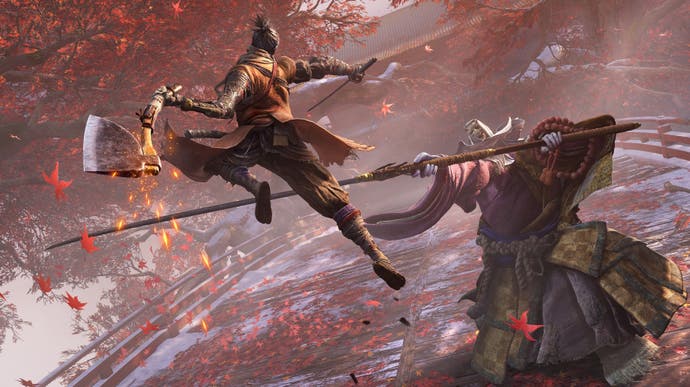
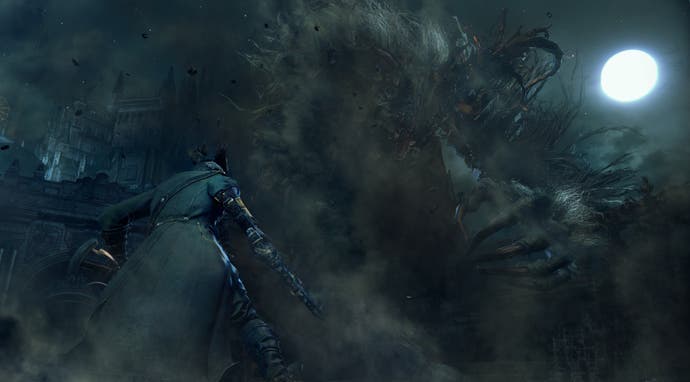
For him personally, though, the notion of challenge is something unique to gaming.
"As a theme, those elements of hardship and that feeling of accomplishment simply have value as an experience," he says. "As a player and as a person, this is not something that can be easily achieved or replicated in our lives. And it's something that carries with it inherent risk.
"In other media especially, it's difficult to replicate that hardship and accomplishment. I think that therein gives the appeal and the value of these games. Of course, it can be felt in parts of other media, but in terms of that risk and reward and that sense of accomplishment you feel with the act of play, that's very unique to games and I think it's very powerful."
"I would say that difficulty is more of a means to an end."
One of Elden Ring's successes, however, was the decision to design an open world, which affords a sense of approachability. With a broad suite of tools, optional challenges, and the simple act of running away, power is placed in the player's hands to adjust the challenge. Pitching that ideal level of difficulty, though, is a challenge in itself.
"The crux of it is, if you are unable to accomplish something, if you're unable to reach that sense of accomplishment, then there's no point," says Miyazaki. "It's important to distinguish that those hardships should be surmountable. We've made a lot of games with this theme in mind."
The open world design of Elden Ring is not the only solution to balancing difficulty, Miyazaki admits, nor is it even the best solution. "This is a difficult subject and it's something we're always looking at, always striving to improve," he says.
Of course, that level of challenge won't be the same for everybody - particularly players with disabilities. Despite his own evolving approach to difficulty, Miyazaki's games have been criticised in the past for not providing enough accessibility options. Sadly, this won't change in Shadow of the Erdtree as Miyazaki admits no new features will be included beyond the base game. "However, this is not something I'm opposed to in the slightest," he says. "And so we're going to continue to look into it and see how we can do those features in our future titles."
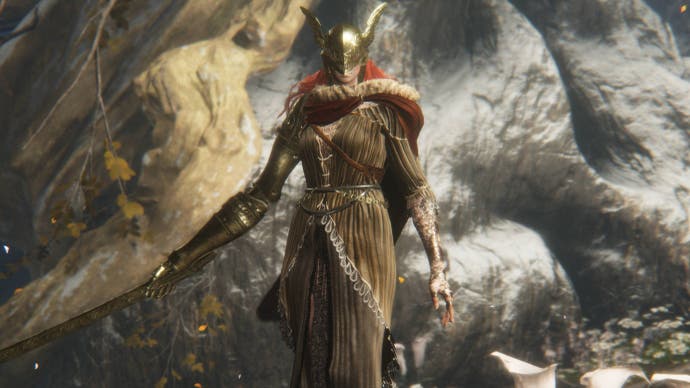
Sometimes, though, after all those heavy themes, seemingly insurmountable odds, and endless cycle of death, you have to pause for a moment and laugh at the futility of your efforts. That's before diving in for just one more go. Miyazaki even described himself in a previous interview as a kind of masochist. I wonder, then, if he can see the humour in his own games.
"There are some areas that are designed to be funny and with humour in mind, but I think a lot of the time things we try to take seriously or try to approach from a serious or dark place tend to get construed as humour," says Miyazaki. "But it's not a calculated thing, we don't set out to make a lot of these games and characters funny. I think it is just interpreted this way and is construed in that way due to the player and the environment they're playing in. A lot of it is not intentional."
Still, modders have certainly found ways to make FromSoft's games more amusing, with new methods of play, new controllers, or speedrunning. Miyazaki says he enjoys this and is "constantly surprised" to see what the community comes up with next. His games have become a "blank canvas" for players to take and transform and experience themselves.
"It's something we shouldn't try to discourage, whether it's speedruns or challenge plays or playing with a banana," he says. "It's something that should be enjoyed and it's just great to see that kind of community interaction."
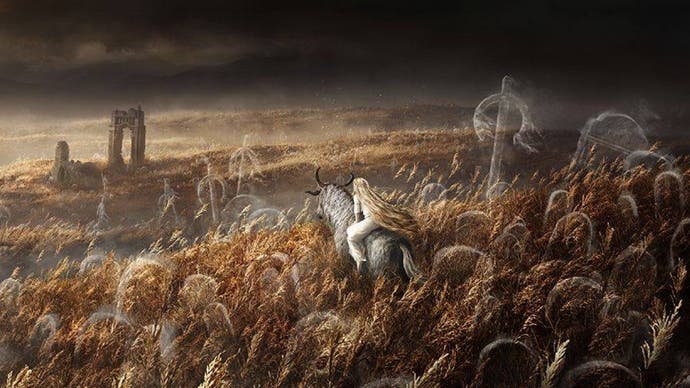
Indeed, there's something about Elden Ring and the Souls games that feels so personal to the player - their own journey, overcoming their own hardships, or even their own interpretation of the narrative. Miyazaki's work is purposefully "fragmented", to use his own word, so the gameplay experience shapes the player's story and he doesn't provide overbearing direction.
He continues: "In terms of story, I like to leave things up to the player's imagination. Again, it's a sort of blank canvas in that respect. Personally I enjoy opportunities to fill in that blank canvas myself, filling it with knowledge. Discovery is fun, it's a fun part of the interaction."
Perhaps, then, it's this sense of ownership that differentiates Miyazaki's work from imitators. Soulslikes aren't just about technical combat, difficult gameplay, or subtle, abstruse storytelling. It's the combination of these elements into a personal experience.
Ahead of the release of Shadow of the Erdtree, I can't wait to discover what Miyazaki has in store for us - or what the game's community will think of next.
.png?width=690&quality=75&format=jpg&auto=webp)


